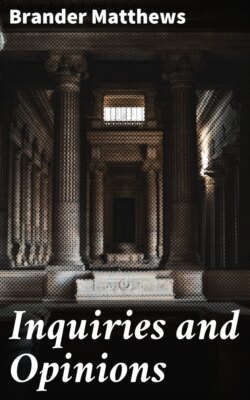Читать книгу Inquiries and Opinions - Brander Matthews - Страница 6
На сайте Литреса книга снята с продажи.
III
ОглавлениеTable of Contents
As significant as the spread of democracy in the nineteenth century is the success with which the abstract idea of nationality has exprest itself in concrete form. Within less than twoscore years Italy has ceased to be only a geographical expression; and Germany has given itself boundaries more sharply defined than those claimed for the fatherland by the martial lyric of a century ago. Hungary has asserted itself against the Austrians, and Norway against the Swedes; and each by the stiffening of racial pride has insisted on the recognition of its national integrity. This is but the accomplishment of an ideal toward which the western world has been tending since it emerged from the Dark Ages into the Renascence and since it began to suspect that the Holy Roman Empire was only the empty shadow of a disestablished realm. In the long centuries the heptarchy in England had been followed by a monarchy with London for its capital; and in like manner the seven kingdoms of Spain had been united under monarchs who dwelt in Madrid. Normandy and Gascony, Burgundy and Provence had been incorporated finally with the France of which the chief city was Paris.
Latin had been the tongue of every man who was entitled to claim benefit of clergy; but slowly the modern languages compacted themselves out of the warring dialects when race after race came to a consciousness of its unity and when the speech of a capital was set up at last as the standard to which all were expected to conform. In Latin Dante discust the vulgar tongue, tho he wrote the 'Divine Comedy' in his provincial Tuscan; yet Petrarch, who came after, was afraid that his poems in Italian were, by that fact, fated to be transitory. Chaucer made choice of the dialect of London, performing for it the service Dante had rendered to the speech of the Florentines; yet Bacon and Newton went back to Latin as the language still common to men of science. Milton practised his pen in Latin verse, but never hesitated to compose his epic in English. Latin served Descartes and Spinoza, men of science again; and it was not until the nineteenth century that the invading vernaculars finally ousted the language of the learned which had once been in universal use. And even now Latin is retained by the church which still styles itself Catholic.
It was as fortunate as it was necessary that the single language of the learned should give way before the vulgar tongues, the speech of the people, each in its own region best fitted to phrase the feelings and the aspirations of races dissimilar in their characteristics and in their ideals. No one tongue could voice the opposite desires of the northern peoples and of the southern; and we see the several modern languages revealing by their structure as well as by their vocabularies the essential qualities of the races that fashioned them, each for its own use. Indeed, these racial characteristics are so distinct and so evident to us now that we fancy we can detect them even tho they are disguised in the language of Rome; and we find significance in the fact that Seneca, the grandiloquent rhetorician, was by birth a Spaniard, and that Petronius, the robust realist, was probably born in what is now France.
The segregation of nationality has been accompanied by an increasing interest in the several states out of which the nation has made itself, and sometimes even by an effort to raise the dialects of these provinces up to the literary standard of the national language. In this there is no disloyalty to the national ideal—rather is it to be taken as a tribute to the nation, since it seeks to call attention again to the several strands twined in the single bond. In literature this tendency is reflected in a wider liking for local color and in an intenser relish for the flavor of the soil. We find Verga painting the violent passions of the Sicilians, and Reuter depicting the calmer joys of the Platt-Deutsch. We see Maupassant etching the canny and cautious Normans, while Daudet brushed in broadly the expansive exuberance of the Provençals. We delight alike in the Wessex-folk of Mr. Hardy and in the humorous Scots of Mr. Barrie. We extend an equal welcome to the patient figures of New England spinsterhood as drawn by Miss Jewett and Miss Wilkins, and to the virile Westerners set boldly on their feet by Mr. Wister and Mr. Garland.
What we wish to have explored for us are not only the nooks and corners of our own nation; those of other races appeal also to our sympathetic curiosity. These inquiries help us to understand the larger peoples, of whom the smaller communities are constituent elements. They serve to sharpen our insight into the differences which divide one race from another; and the contrast of Daudet and Maupassant on the one hand with Mark Twain and Kipling on the other brings out the width of the gap that yawns between the Latins (with their solidarity of the family and their reliance on the social instinct) and the Teutons (with their energetic independence and their aggressive individuality). With increase of knowledge there is less likelihood of mutual misunderstandings; and here literature performs a most useful service to the cause of civilization. As Tennyson once said: "It is the authors, more than the diplomats, who make nations love one another." Fortunately, no high tariff can keep out the masterpieces of foreign literature which freely cross the frontier, bearing messages of good-will and broadening our understanding of our fellowmen.
